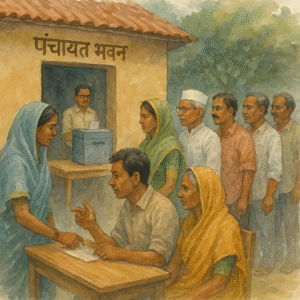Simplified Explanation of the Judgment
In a recent judgment, the Patna High Court has emphasized the fundamental importance of the “right to be heard” before any punitive action is taken by the government. The petitioner, a registered construction contractor, challenged an order issued by the Public Health Engineering Department (PHED), Government of Bihar, that debarred him from participating in any future tenders.
The petitioner argued that the impugned debarment order was arbitrary and illegal because it was issued without following due process. He claimed that no show-cause notice or opportunity to present his case was given prior to the issuance of the debarment. Furthermore, he contended that the Bihar Contractors Registration Rules, 2007, do not provide any specific provision empowering the department to blacklist or debar a contractor.
The High Court took note of these grievances and carefully examined the issue from the perspective of constitutional and administrative law principles. The bench highlighted that blacklisting a contractor has serious civil consequences, especially when it affects a person’s right to engage in future business with the government.
Importantly, the court cited landmark judgments from the Supreme Court of India that reinforce the doctrine of natural justice. In the case of Raghunath Thakur vs State of Bihar (1989) 1 SCC 229, the Apex Court held that even if rules do not explicitly require a notice before blacklisting, it is an implied legal requirement rooted in fairness and equity. Similarly, in Erusian Equipment & Chemicals Ltd. vs State of West Bengal (1975) 1 SCC 70, the Supreme Court underscored the government’s obligation to maintain transparency and non-discrimination in public contracting.
Applying these precedents, the Patna High Court concluded that the petitioner had indeed been wronged. It ruled that the order dated 31.12.2024 debarring the contractor from tenders was passed without affording a hearing, which amounts to a violation of the principles of natural justice.
Consequently, the High Court set aside the debarment order and directed the concerned PHED authorities to initiate any such future proceedings only after giving the petitioner a fair chance to be heard. The court also quashed a related order that was challenged through an interlocutory application (I.A. No.1 of 2025), as that too was issued without hearing.
This judgment once again reiterates that while the government has the authority to manage contracts and safeguard public interest, it must do so within the legal framework, respecting constitutional protections such as Article 14 (Right to Equality) and the principles of natural justice.
Significance or Implication of the Judgment
This judgment is significant for contractors, suppliers, and service providers engaged with government departments. It reinforces the principle that no individual or entity can be penalized without being given an opportunity to present their side of the story.
For the government, the ruling is a reminder to ensure procedural fairness before issuing orders that carry serious civil consequences, such as blacklisting or debarment. It also encourages greater transparency in public procurement and tender processes.
In the broader legal landscape, the judgment strengthens administrative fairness and builds trust in institutional decision-making. It also provides clear judicial guidance for departments on how to structure actions that may affect an individual’s right to trade or do business with the government.
Legal Issue(s) Decided and the Court’s Decision with Reasoning
- Whether a contractor can be debarred from future tenders without being given an opportunity of hearing?
- Decision: No. The debarment without hearing violates the principle of natural justice.
- Reasoning: The court relied on Supreme Court precedents that state any action with civil consequences must follow fair procedure, including prior notice and opportunity to be heard.
- Whether the Bihar Contractors Registration Rules, 2007 authorize debarment without hearing?
- Decision: No such provision exists in the Rules.
- Reasoning: The High Court found that the impugned action had no backing in the said Rules, and therefore was without legal authority.
- What is the remedy when such an order is passed unlawfully?
- Decision: The order is to be quashed.
- Reasoning: The court set aside the debarment and related orders, and allowed authorities to take fresh action only after proper hearing.
Judgments Referred by Parties
- Raghunath Thakur vs State of Bihar & Others, (1989) 1 SCC 229
Judgments Relied Upon or Cited by Court
- Central Organisation for Railway Electrification vs ECI SPIC SMO MCML (JV), 2024 SCC OnLine SC 3219
- Erusian Equipment & Chemicals Ltd. vs State of West Bengal, (1975) 1 SCC 70
Case Title
M/S Bolbum Construction vs The State of Bihar & Others
Case Number
Civil Writ Jurisdiction Case No.734 of 2025
Coram and Names of Judges
Hon’ble Mr. Justice P. B. Bajanthri
Hon’ble Mr. Justice Sunil Dutta Mishra
Names of Advocates and Who They Appeared For
For the Petitioner: Mr. P.N. Shahi, Senior Advocate, with Mr. Ravi Kumar, Advocate
For the State: Mr. S. Raza Ahmad, AAG-5, with Mr. Alok Ranjan, AC to AAG-5
Link to Judgment
https://www.patnahighcourt.gov.in/ShowPdf/web/viewer.html?file=../../TEMP/f6c9091e-450e-44bf-80ff-aaa889775c56.pdf&search=Blacklisting
If you found this explanation helpful and wish to stay informed about how legal developments may affect your rights in Bihar, you may consider following Samvida Law Associates for more updates.








